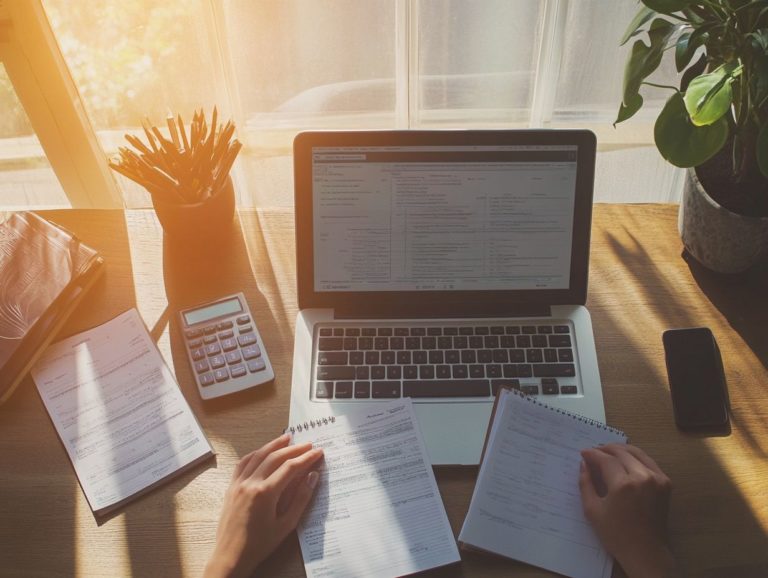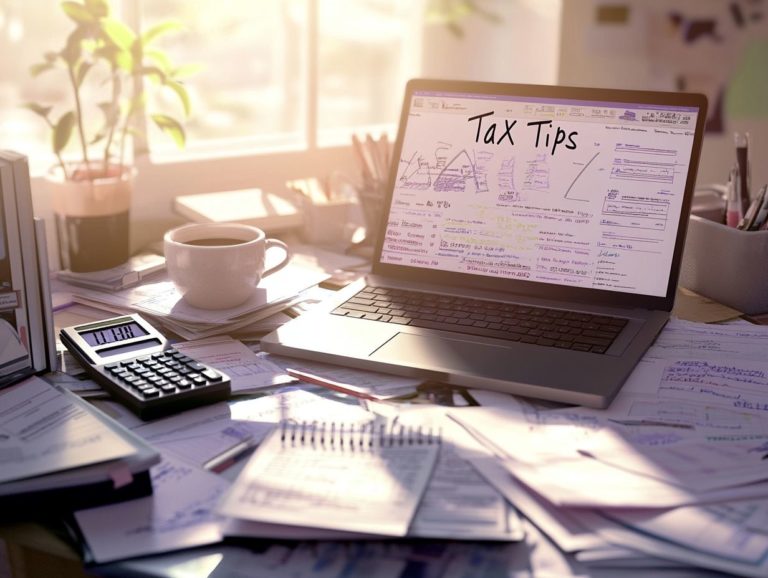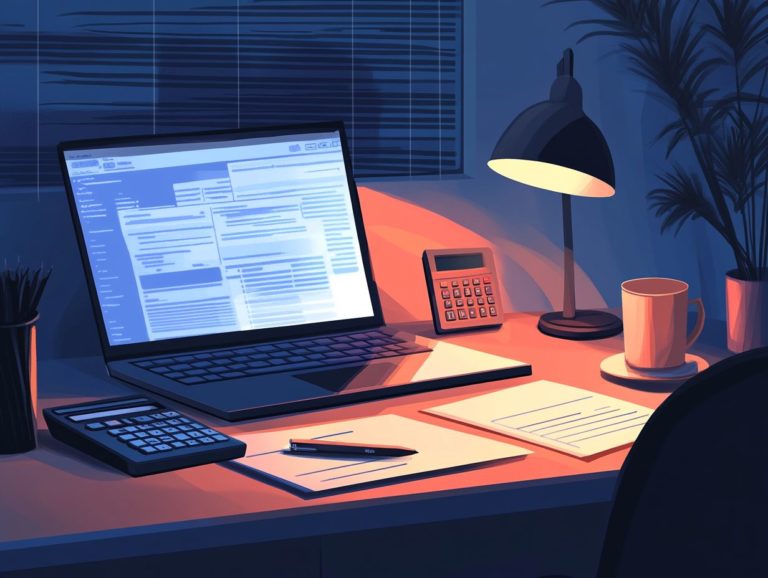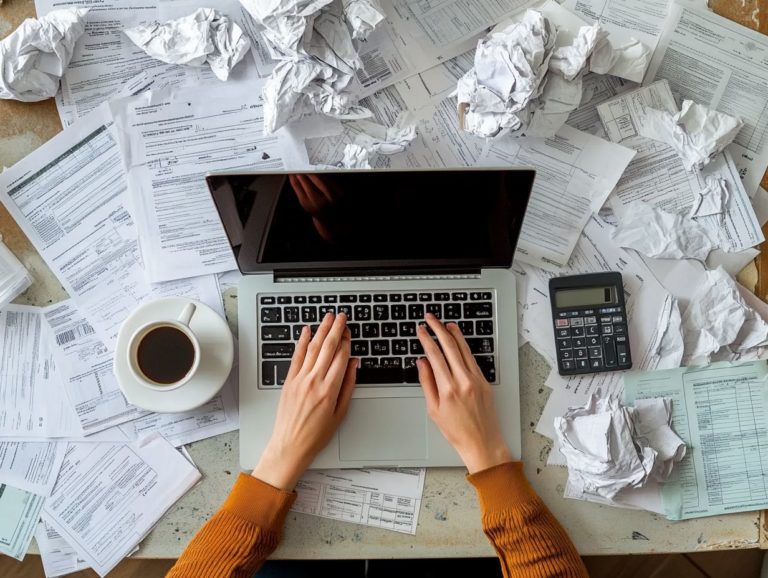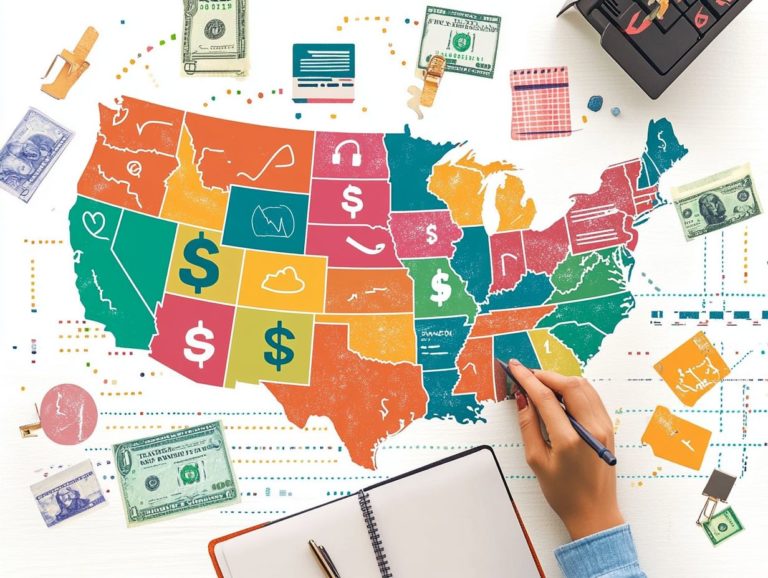How to Claim Travel Expenses as a Freelancer
Navigating travel expenses can be a challenge for freelancers. Understanding what qualifies as a deductible expense is crucial for maximizing your tax return.
From carefully organizing receipts to using apps that simplify the process, this guide covers everything you need. You will discover the differences between deductible and non-deductible expenses, how to claim expenses effectively, and strategies for budgeting and negotiating reimbursements with clients.
Get ready to transform your travel costs into valuable deductions that boost your finances!
Contents
Key Takeaways:
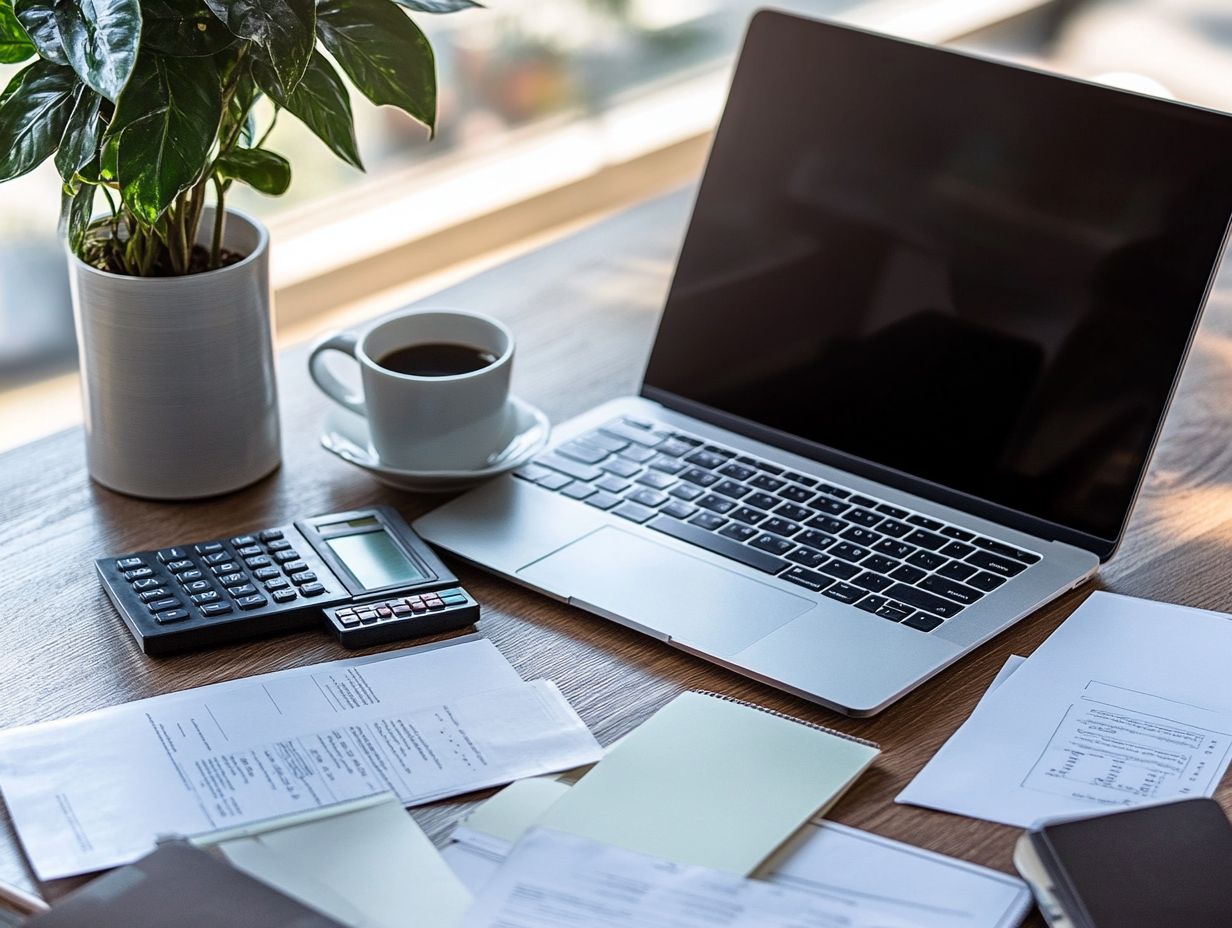
- Know what counts as a travel expense for freelancers to ensure you are claiming the correct expenses.
- Keep track of your travel expenses by organizing and recording receipts or using apps and tools to simplify the process.
- Differentiate between deductible and non-deductible expenses to accurately report them on your tax return and reduce your taxable income as a freelancer.
Understanding Travel Expenses for Freelancers
Understanding travel expenses is essential for freelancers. These costs can significantly influence your income and tax situation.
When you embark on business trips, you encounter a range of expenses from accommodation to transportation and meals that can be claimed as tax deductions. Grasping how to categorize these costs allows you to manage your finances more effectively and ensures compliance with rules set by the tax authority. For freelancers, understanding how to optimize your tax refund is crucial, whether you’re in the US or the UK.
This knowledge helps you claim deductions and settle expenses confidently during your business activities.
What Qualifies as a Travel Expense?
Travel expenses for freelancers generally include lodging expenses, transportation expenses, and meal costs incurred during business trips.
Lodging expenses cover hotel stays or rentals required while on assignment. Transportation costs can include everything from flights and train fares to car rentals and gas expenses. These reflect the financial demands of your journey. Meal expenses are also significant; freelancers dining out for work-related meals often have the chance to claim these costs as necessary expenses. To ensure you’re fully prepared for tax season, consider reviewing how to prepare for tax season as a freelancer.
It’s vital to keep all documentation, such as receipts and bills, to prove expenses. This not only facilitates accurate tax deductions but also provides a clearer financial picture of your business travel.
Why is it Important to Claim Travel Expenses as a Freelancer?
Claiming travel expenses is crucial for freelancers. It profoundly impacts your taxable income and overall financial well-being.
By carefully documenting and filing these expenses, you can significantly reduce your taxable income, leading to a lighter tax burden. This process allows you to reclaim a portion of your expenditures incurred during essential business trips, whether you’re attending client visits, industry trade fairs, or conducting site visits.
For instance, if you travel to a conference for networking events, you can claim all related expenses, including transportation, lodging, and meals. Keep in mind that careful recordkeeping is vital; it serves as proof for the tax office and ensures that every eligible deduction is captured. For freelancers, utilizing helpful resources like 5 tips for freelancers on tax write-offs can help you fully benefit from your work-related travels.
Keeping Track of Travel Expenses
Monitoring your travel expenses is crucial for freelancers. It ensures that your claims are precise and guarantees compliance with tax regulations, maximizing your potential tax savings.
By staying organized, you protect your finances and streamline the process come tax time, particularly when handling ordinary expenses.
Organizing and Recording Receipts
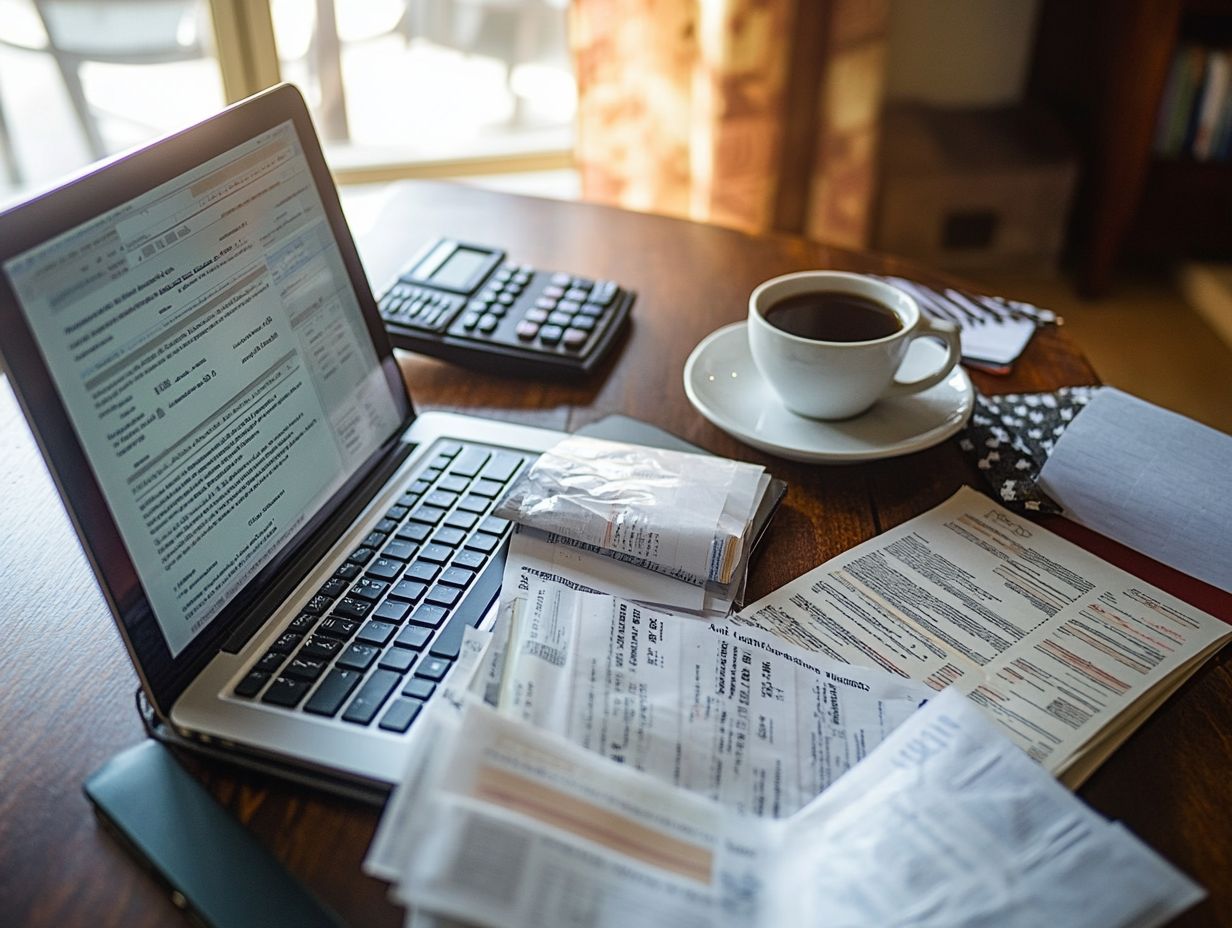
Organizing and recording receipts is essential for managing your travel expenses as a freelancer. This keeps all your business expenses kept and ready for potential tax deductions.
By embracing best practices, such as digital scanning and categorizing receipts by type of expense, you can significantly streamline your record-keeping process. Utilizing apps or software specifically designed for expense tracking can make this task a breeze, allowing for quick uploads and easy retrieval when tax season is around the corner!
Maintaining these records isn t just about convenience; they are crucial for proving your proof of expenses to tax authorities. This provides solid proof of your business-related expenditures.
With organized documentation at your fingertips, you’ll save time and stress when preparing for audits and ensure you maximize those eligible deductions, including meal allowance rates.
Using Apps and Tools to Simplify the Process
Utilizing apps and tools can transform the way you track travel expenses as a freelancer, making detailed recordkeeping not just manageable, but effortless.
With numerous applications available, you can discover tailored solutions like Expensify, TripIt, and Mint. These platforms don t just help you log each expense; they automate calculations, ensuring accuracy and efficiency for business purposes.
Imagine being able to upload receipts directly, categorize expenses in real time, and generate detailed reports. These features are invaluable for maintaining your organization.
As tax season approaches, having your expenses systematically tracked enables you to prove your claims effortlessly, reducing stress and maximizing deductions.
By harnessing these resources, you can focus more on your work and less on the daunting paperwork that often comes with it.
Deductible vs Non-Deductible Expenses
Knowing the distinction between deductible and non-deductible expenses is essential for freelancers as they navigate their tax obligations with both the IRS (Internal Revenue Service) and HMRC (Her Majesty’s Revenue and Customs). Understanding this helps you keep more money in your pocket and enhances your financial strategy.
Knowing the Difference and How it Affects Your Taxes
Understanding the difference between deductible and non-deductible expenses is crucial as it directly influences the amount of taxes you owe as a freelancer, especially regarding tax privileges.
Misclassifying these expenses can lead to serious consequences, such as audits or penalties from tax authorities like the IRS or HMRC. When you incorrectly categorize deductibles, it raises a red flag and suggests potential tax evasion, prompting tax authorities to review your financial records. The penalties for misreporting can accumulate quickly, resulting in a heavier financial burden.
Knowing which expenses qualify as deductible helps you maintain compliance and maximize your potential tax savings, key to managing ordinary expenses.
Claiming Travel Expenses on Your Taxes
Claiming travel expenses on your taxes may seem straightforward, yet it requires a clear understanding of how to report these expenses accurately on your tax return, including transportation, meals, and accommodation.
Ensuring precision in this process can maximize your deductions and optimize your financial outcomes, especially in the context of business-related meals.
Start organizing your expenses today to avoid stress during tax season!
How to Report Travel Expenses on Your Tax Return
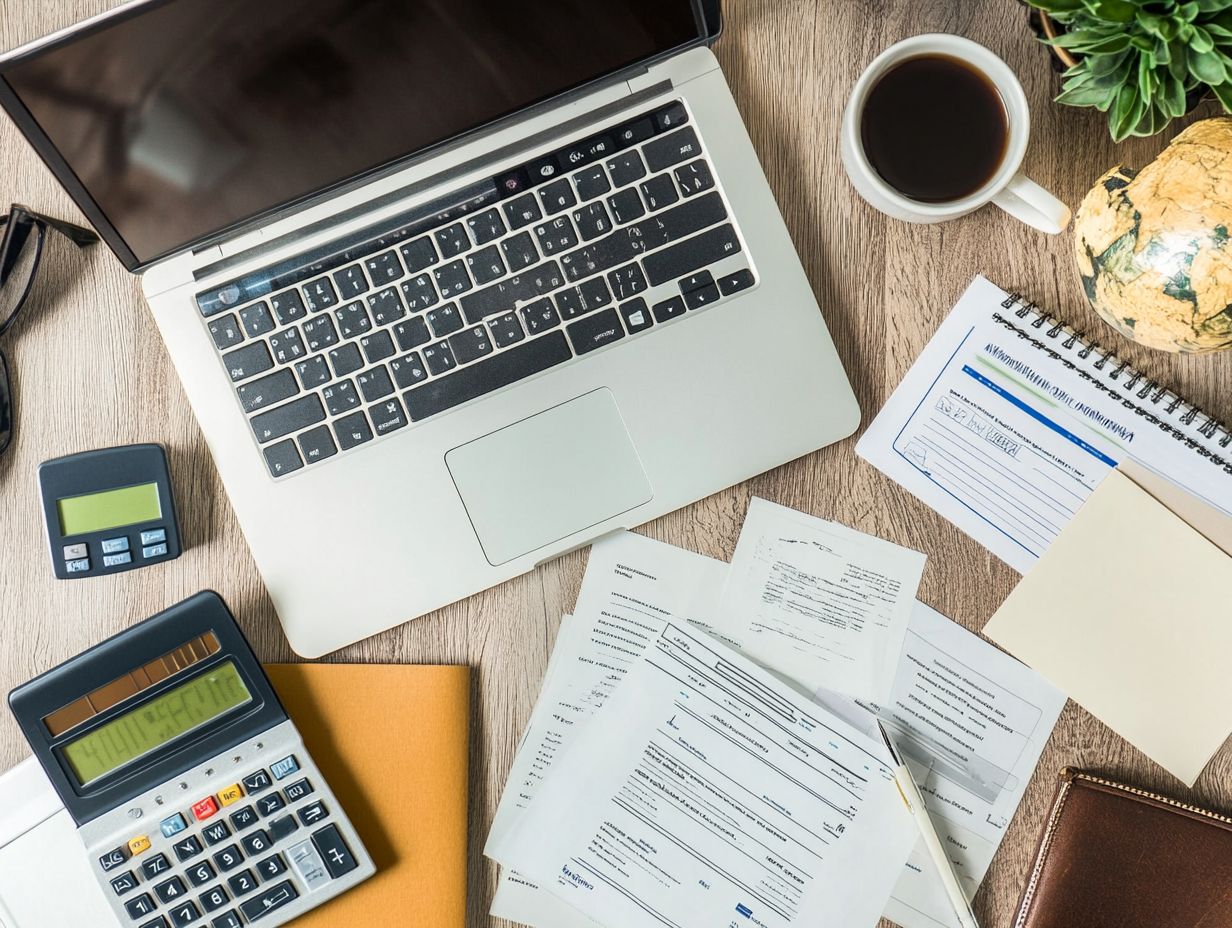
Reporting travel expenses on your tax return requires you to carefully sort your claims and submit all necessary receipts and bills.
Understanding the details of this process is vital to avoid any problems with tax authorities. Use the correct forms, like IRS Form 2106 or Schedule C for businesses.
Accurately classifying each cost whether it s transportation, meals, or lodging is essential. This helps support the deductions you can claim.
To strengthen your claims, attach your receipts. Keep physical copies or scanned versions of these documents for electronic filing. Proper documentation affirms the legitimacy of your expenses and ensures a smoother experience during any audits.
Maximizing Your Deductions
Maximizing your deductions as a Freelancer is crucial for minimizing tax liabilities and fully capitalizing on available tax advantages, especially for business-related meals.
Stay informed about the various categories of deductible costs like travel, supplies, and home office use. This allows you to plan your finances wisely.
For instance, keeping detailed records of your travel itineraries and receipts can significantly bolster the legitimacy of your claimed deductions.
Recognize allowable expenses associated with business trips, including transportation costs, lodging, and even meals, as long as they align with IRS guidelines. For freelancers, understanding how to save for taxes is also crucial to ensure compliance and optimize deductions.
Stay vigilant to avoid common pitfalls, such as failing to separate personal and business costs or underestimating potential deductions. For freelancers, learning how to track your freelance expenses efficiently can make a significant difference. With thoughtful financial planning and careful documentation, maximizing your travel deductions becomes straightforward and rewarding.
Tips for Saving Money on Travel Expenses
Saving money on travel expenses is essential for Freelancers who seek to uphold profitability during business trips and networking events. By managing these costs effectively, you can maximize your resources and focus on what truly matters: building connections and growing your business!
Budget-Friendly Travel Options
Ready to save money? Explore budget-friendly travel options that not only cut costs but also enhance your experience!
Opting for budget-friendly travel options can significantly trim transportation costs for Freelancers on business trips.
Explore economical accommodations, lodging expenses, cost-effective transportation choices, and budget-conscious meal plans. Transform your trips into fulfilling experiences and wallet-friendly adventures.
For instance, choosing to stay in hostels, guesthouses, or utilizing home-sharing platforms can offer a comfortable stay without straining your budget.
Consider alternative methods like public transit or carpooling services to navigate unfamiliar cities without the hefty price tag. In terms of dining, local diners or food markets often serve delicious dishes at a fraction of the cost compared to high-end restaurants.
Keeping track of meal expenses can also help you stay within budget. To uncover the best deals, frequent traveler sites and apps are invaluable resources that ensure you enjoy quality experiences without inflated costs.
Utilizing detailed recordkeeping through these platforms can help you manage your ordinary expenses effectively.
Negotiating with Clients for Reimbursement
Negotiating with clients for reimbursement of travel costs is essential for self-employed individuals.
Understanding that these expenses are vital for project success can change your client’s perspective.
By explaining the importance of travel for client meetings, site visits, or networking events, you can present these costs as investments.
This approach emphasizes the necessity of travel. It also highlights the collaborative nature of your business relationship, which benefits both parties.
Show how these arrangements lead to better outcomes. This can foster goodwill and encourage clients to discuss funding these essential expenses.
Always provide documentary evidence and proof of expenses to support your claims.
Frequently Asked Questions
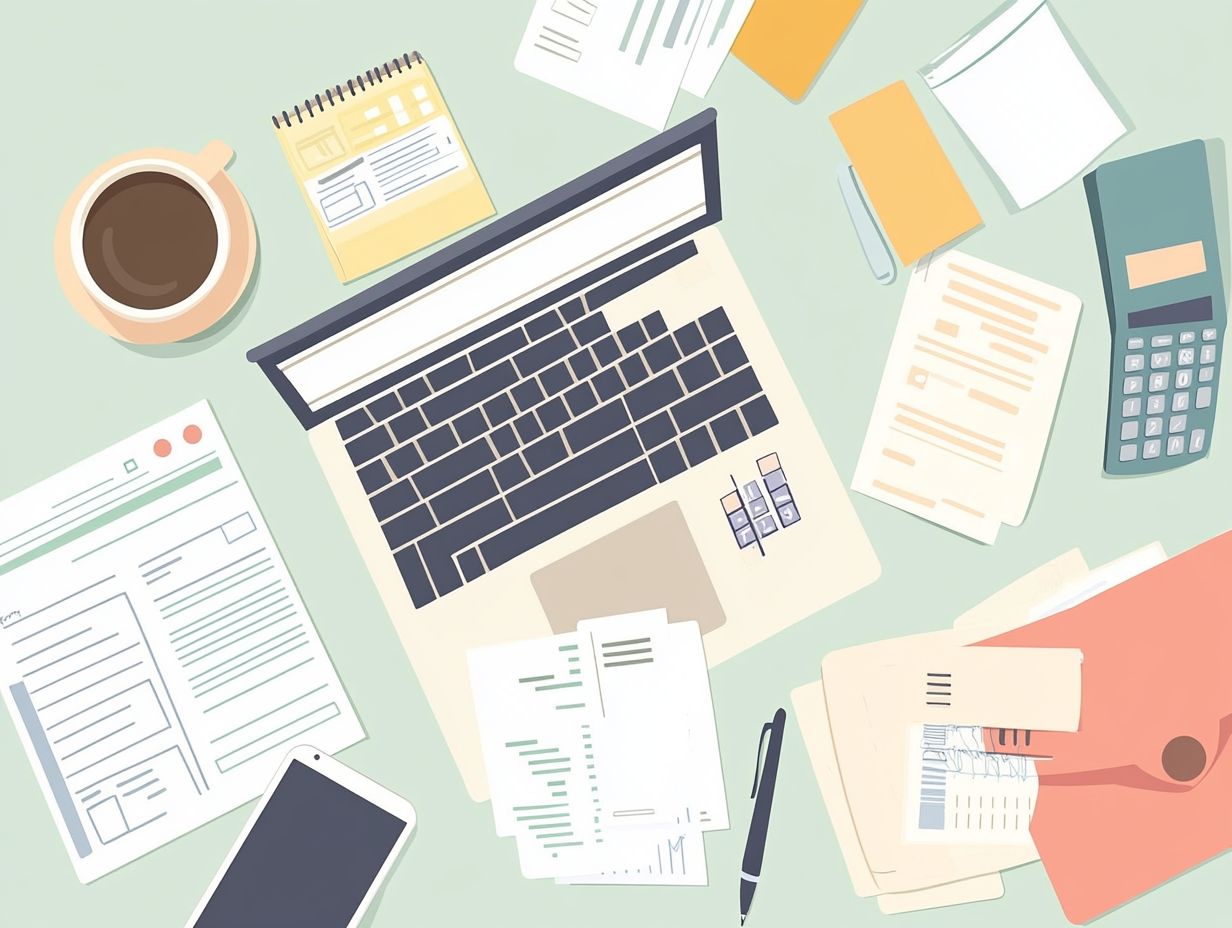
How do I claim travel expenses as a freelancer?
To claim travel expenses, keep detailed records of your business travel and associated costs, including receipts and mileage logs.
What types of travel expenses can I claim?
You can claim expenses for business trips, including airfare, lodging, meals, and transportation. Supplies or equipment needed for your trip may also be eligible.
Do I need to list out my travel expenses?
Yes, it s important to break down each cost and provide supporting documentation. This helps ensure accuracy and easy verification.
Are there limitations on the amount I can claim?
There are limitations on travel expenses. The Internal Revenue Service (IRS) and Her Majesty’s Revenue and Customs (HMRC) have specific guidelines.
Can I claim travel expenses for personal trips?
No, claim only those related to business trips. If your trip has both personal and business activities, only claim relevant expenses.
When should I file for travel expenses?
File for travel expenses as soon as possible after your trip. Keeping accurate records makes it easier to claim on your taxes.

